
Ev'rybody down!: The Navy Lark at 65
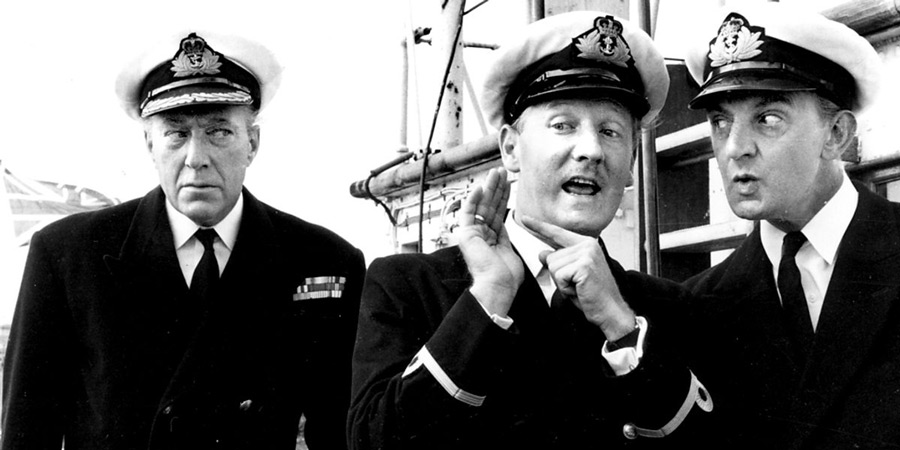
'Left hand down a bit!': a cry that heralded the sound of HMS Troutbridge hitting something with an enormous crash - and with this crew that 'something' could be the quay, a harbour wall, a mine or anything else that happened to be in their way at the time.
This was radio show The Navy Lark, depicting the adventures of a hapless band of sailors in the Royal Navy aboard the frigate HMS Troutbridge, stationed at port for the first two series on a "small island off Portsmouth", and later more specifically in Portsmouth itself.
Running from 1959 to 1977 across 15 series and 241 episodes, plus specials, the sitcom was first broadcast on the BBC Light Programme on 29th March 1959, with most editions repeated on the BBC Home Service. From around the middle of Series 9, it aired on the newly formed BBC Radio 2, with some episodes repeated on BBC Radio 4 in Series 12 and 13. As it celebrates its 65th anniversary, it remains one of the most enduring and long-running sitcoms on radio.
Each episode started with the unmistakable theme music, Trade Wind Hornpipe, written and performed by Tommy Reilly - a jolly tune that perfectly sets the tone and is instantly recognisable - before Phillips, Pertwee and Murray inevitably found themselves in some kind of scrape or trouble whilst avoiding the wrath of Commander 'Thunderguts' Povey, who usually wanted to get them to do some work or go on an exercise that no one else wished to do.
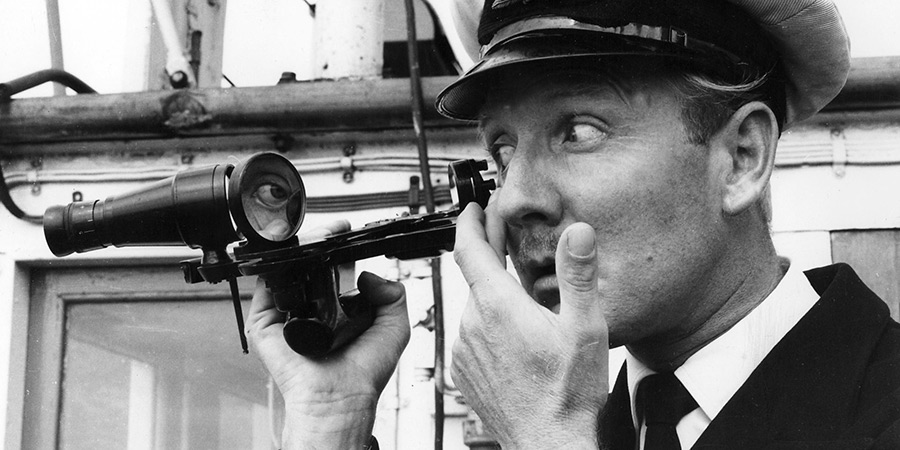
The Navy Lark episodes were self-contained; there wasn't a continuous story arc across episodes, the only common thread being the crew being hopeless and more than often crashing the ship into things. This meant you could listen to them in any order. You knew the crew were inept and would mess up every week - it was just how they were going to mess up that led to the story. The comedy was almost wholly character, rather than narrative, driven, but also relied heavily on funny voices, invented words and phrases and a healthy dollop of, albeit gentle, innuendo.
Much of that gentle innuendo came from the rakish charm of Leslie Phillips as Sub Lieutenant Phillips, a characterisation not far removed from his public persona. Mr Phillips had an eye for the ladies and was incredibly charming and well-spoken. As a Sub-Lieutenant he was a terrible navigator, regularly leading to both the comic capers contained in each episode and many of the raft of catchphrases the show became famous for. We've already mentioned 'left hand down a bit' but a crash into a harbour wall or other unfortunate ship would often elicit a cry of 'Oh, lummy!' from our dashing hero.
Indeed, Leslie Phillips adored The Navy Lark and prided himself on having never missed the recording of a single episode. Such was his loyalty to the show he even flew back from Rome in 1959, where he was shooting the film Ferdinando I° re di Napoli, recorded the latest episode and flew straight back to Italy, with the meagre BBC fee for the work not even covering half his travel costs. But it didn't matter. Phillips said of the show in his autobiography Hello: 'The Navy Lark was one of those jobs where money was irrelevant, and there aren't many of those in an average actor's life.'
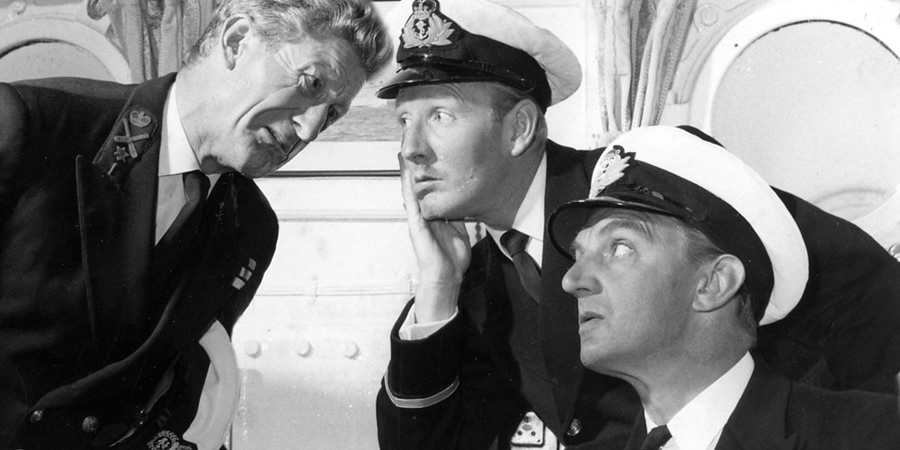
Chief Petty Officer Pertwee, played by Jon Pertwee, was always dreaming up a money-making scheme or two, and these were at the heart of any scrape the gang got themselves into. He'd also be the one to shout the catchphrase 'Ev'rybody down' as the Troutbridge hit something, no doubt after another spate of hopeless navigation by Mr Phillips. Incidentally, Pertwee spent six years in the navy during the Second World War, first rising to the rank of Sub Lieutenant and after that working with the top secret Naval Division.
Later in the show's run Pertwee provided some other voices, playing to his comic strengths. Before The Navy Lark he had been in the radio series Merry-Go-Round and Up The Pole and was once billed at the Wood Green Empire as 'the most versatile voice in radio'; he also enjoyed success with his own radio comedy, Pertwee's Progress.
When the series began it was seen as a vehicle for Phillips, Pertwee and well-known film actor Dennis Price, who played Number One, Lieutenant Price. However, Dennis was only in the first series: he couldn't return for the second as he was committed to appearing in a play in New York. Unfortunately the play was not a success and, according to Phillips, Price cried when he was told he couldn't have his old job back on the show.
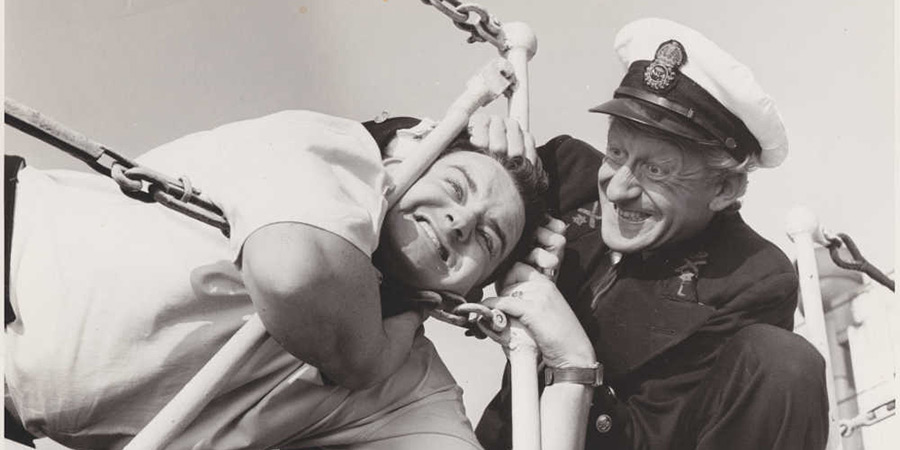
Replacing Price was actor Stephen Murray, who remained with The Navy Lark until the end, firstly as Lieutenant Murray and then promoted to Lieutenant Commander Murray, but always Number One. He was a classically trained actor who had studied at RADA and appeared with Laurence Olivier at the Old Vic, and went on to perform in over 300 radio plays. As a character in the show, he was permanently and utterly bemused by what was happening around him and eventually married the Admiral's daughter. In real life, his daughter Amanda appeared in some later episodes and voiced various additional characters.
The crew were constantly attempting to escape the beady eye of Commander, later Captain, Povey, played by Richard Caldicot. Affectionately known as 'Old Thunderguts' he had absolutely no faith in the crew of HMS Troutbridge and would relish in sending them on awkward missions that no one else wanted to do.
There was also a tremendous supporting cast on The Navy Lark, including Michael Bates as the Padre, Tenniel Evans as Able Seaman Taffy Goldstein and of course Heather Chasen. Heather was important as she was one of the few women on the show. Judy Cornwell joined in Series 4 as Wren Cornwell and April Walker in Series 15 as Wren Barrett, but Heather would consistently pop up as Wren Chasen throughout the series. She also played the daughter of Admiral Ffont-Bittocks who marries Lieutenant Commander Murray; a gin fuelled Lady Todd-Hunter Brown; and Romana Povey, whom she once described to The Navy Lark Appreciation Society as a character played as 'if they were a man in a drag act playing a woman playing a man'!
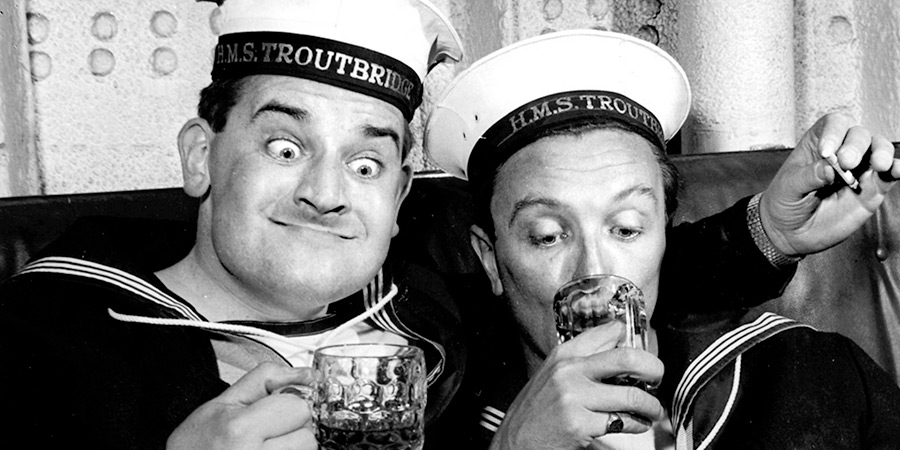
However, the most notable additional cast member was undoubtedly Ronnie Barker. When the series started in 1959, Ronnie was not yet a star name. He had been in repertory theatre for several years learning his craft as an actor, which led to him transferring to West End shows by the middle of the decade. Radio work had come along as a result of this West End success and, by the second series of The Navy Lark, his role as Able Seaman 'Fatso' Johnson was notably written up. Such was his skill and versatility with voices and his rapport with the cast - particularly Phillips and Pertwee - that he also voiced Lieutenant-Commander Stanton. Scenes between Barker and Pertwee were very popular with the listeners, often ending with Johnson's lament of a catchphrase 'You're rotten, you are' when Chief Petty Officer Pertwee wanted him to do some menial or messy task.
Barker left the show when more work on TV came along, particularly with David Frost, and filming and recording schedules clashed. In the authorised biography of Ronnie Barker by Bob McCabe, it is noted that billing on initial commercial releases of the series had Barker fifth but, on later editions, he was bumped up to the second spot after Jon Pertwee - an indication of his rising and sustained star status with the British public.
There was an incredible team spirit on the show and in interviews Barker, Phillips and Pertwee have all spoken of how well they got on, enjoyed working together and how they kept in touch. It was Jon Pertwee who first introduced Leslie Phillips to the delights of getting away to the Spanish island of Ibiza and Phillips - already a noted screen star - would put Ronnie Barker's name forward for roles in films he was in.
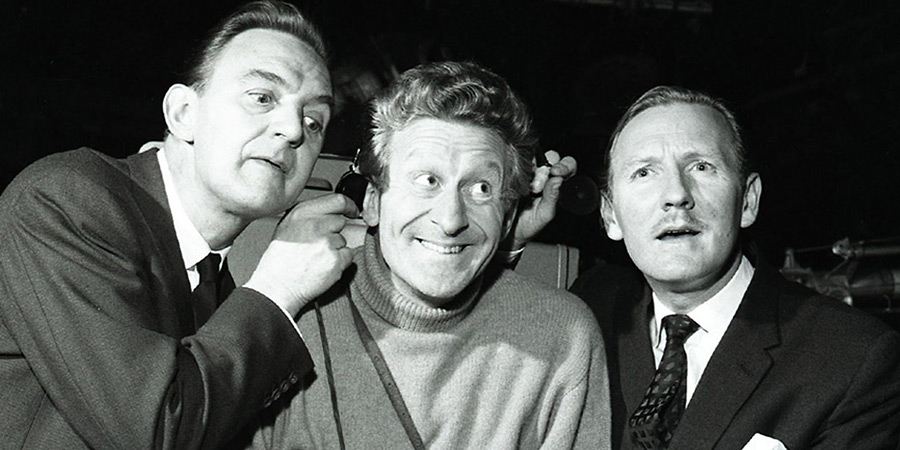
Their comradery was felt especially on recording days. The team would arrive at the studio on a Sunday afternoon to rehearse before recording two shows in the evening. Upon arrival they would immediately retire to the canteen for coffee, sticky buns and a catch-up. Such recording days occurred fortnightly, meaning there was always a lot of gossip and laughter. They would rehearse from 3pm - 6pm, then call out for more coffee and buns before recording from 7pm - 9pm. The whole process ran like clockwork, and the man in charge of this well-oiled machine was producer Alastair Scott Johnston.
Jon Pertwee often laid claim to the original idea for the show, or said that it was written as a vehicle for him, depending on which version of events you read, but according to Johnston's extensive diaries, writer Lawrie Wyman independently wrote a synopsis of a comedy about military life and took it to him for consideration. Wyman already had a few writing credits for radio and TV under his belt by that point, notably on the ill-fated Morecambe & Wise series Running Wild.
Alastair Scott Johnston had a long career with the BBC working in light entertainment, but The Navy Lark was his biggest show with them by far. When Wyman first took him the script two things needed sorting. Firstly, Wyman hadn't settled on a military service to base it on. Johnston had been in the Army and Wyman the Air Force so they plumped for a show about the Navy so that neither man could 'pull rank' on experience of protocol. Secondly, the script was not to Johnston's exacting standards, so he re-wrote most of it.
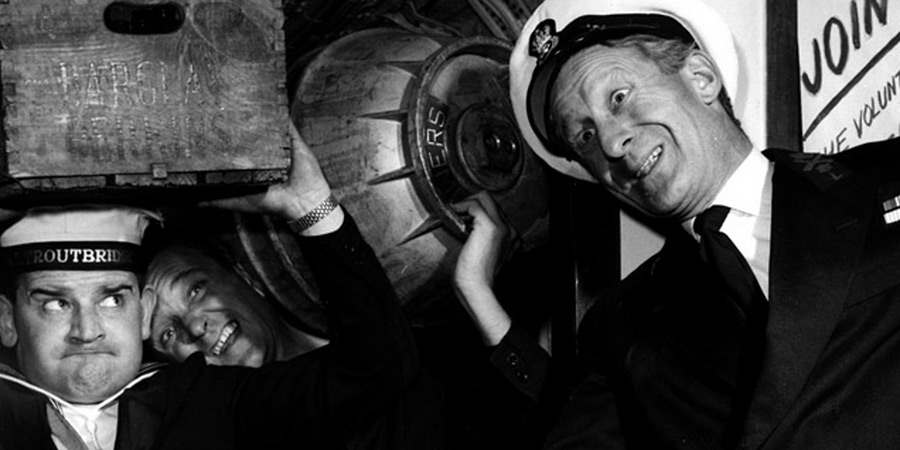
The Navy Lark was very much Johnston's production and he kept a tight ship - as it were. He would perform the audience warm-up himself, noting any large coach parties that were in that night so he could mention and welcome them, and he'd always do a gag with an unsuspecting victim on the front row, telling them to expect someone to sit on their seat at some point in the recording so they would have to give it up. Such was his commitment and professionalism that he would also re-record a whole scene if there had been a technical sound or cue light error, not just the portion that needed doing again. You don't make a show that runs for 18 years and is still loved and talked about 65 years on from its first recording without having a high level of quality control.
Testament to its popularity, numerous spin-offs launched over the years. The first, a film adaptation. opened in cinemas in the same year the radio original debuted (1959). Such was the success of the first series that film rights were secured almost immediately; however, the ensuing production is a disappointing affair for many fans and you'd be forgiven for not recognising it as having any relation to the original. The screenplay was again written by Lawrie Wyman, but now in conjunction with Sid Colin, who was then best known for penning The Army Game. Unfortunately almost everything changed from the familiar radio comedy.
HMS Troutbridge became HMS Compton: no longer a frigate but a wooden-hulled minesweeper; the location was implied to be somewhere in the Channel Islands; and in an attempt to cast stars known to cinema-goers, Pertwee, Chasen, Barker and Evans didn't make the cut. It was rumoured that Pertwee was initially offered a part but, with the producers allegedly refusing to cast Dennis Price because he was a homosexual, he turned them down in support. The only original cast member to make it from wireless to the silver screen was Leslie Phillips, who was already a well-known British film star - but he didn't even play the same character!
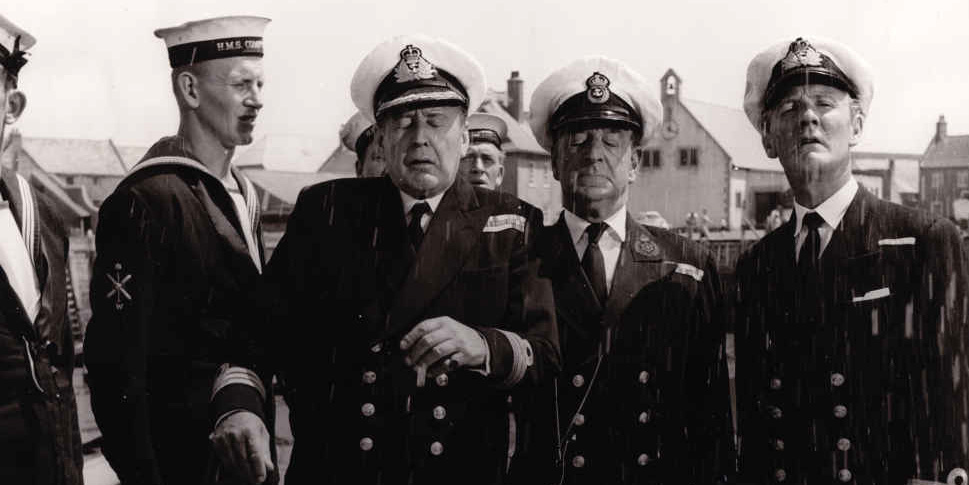
In 1963, with television starting to eclipse radio as the most popular medium of entertainment and the BBC's Head of Light Entertainment believing military-based comedies had had their day, Wyman attempted to transform the show. What was intended as the sitcom's fifth series, The TV Lark launched. Its premise was that the entire crew had been thrown out of the forces and ended up working at 'Troutbridge TV'. Janet Brown replaced Heather Chasen and 10 episodes were produced, but the change in setting proved unpopular with listeners. A new batch of six regular The Navy Lark episodes quickly followed, billed as Series 5 and rewriting The TV Lark into failed-spin-off status.
There were two later spin-offs, but, featuring different casts, they were slightly more palatable to the public and enjoyed greater success. The Embassy Lark was the first, running from 1966 to 1968 and starred Frank Thornton and Derek Francis. It was set in the British Embassy of the fictional country of Tratvia, allowing Wyman to write a civil service-based situation comedy. There was some crossover as Ronnie Barker, Stephen Murray and Leslie Phillips popped up as their The Navy Lark characters in two episodes, with star Thornton also crossing back to Navy as his character, Sir Henry Pettigrew.
The last of the Larks came in 1969 with 13 episodes of The Big Business Lark starring Jimmy Edwards. He was apparently not the first choice for the role, although it's not clear who was; due to his hiring, a rapid re-write and change of tone to the show was made to accommodate his popular comic persona. Frank Thornton returned again, this time as deputy chairman of the business in question - British United Plastics - and son to the chairman, Sir Charles Boniface (Edwards). However, the sitcom was never a favourite of Wyman and Scott Johnson, and that's probably why it only survived one series.
Still very much loved by comedy fans today, The Navy Lark holds a special place in the history of both the medium and the genre, as for many years it was the longest-running comedy show on air - even now it remains high in the rankings. It's still repeated on BBC Radio 4 Extra and cries of 'Corrrr', 'Ev'rybody down' and 'Left hand down a bit' are still making us laugh 65 years on.
Where to start?
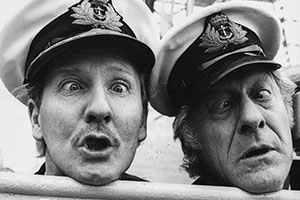
Series 3, Episode 18 - Mr Phillips Has Navigation Tuition
The Admiral is glad to say that naval expenditure has gone down for the year, apart from one exception - HMS Troutbridge has racked up a repairs bill equivalent to the rest of the fleet combined.
From the show's (extended) period of the height of its popularity, this episode is packed with laughs and a wealth of the key comic traits The Navy Lark remains beloved for.
The show has been extensively released in audio formats, and newly reissued to download for its anniversary. See The Navy Lark shop pages for a list for all options.
Help us publish more great content by becoming a BCG Supporter. You'll be backing our mission to champion, celebrate and promote British comedy in all its forms: past, present and future.
We understand times are tough, but if you believe in the power of laughter we'd be honoured to have you join us. Advertising doesn't cover our costs, so every single donation matters and is put to good use. Thank you.
Love comedy? Find out moreThe Navy Lark - Series 1 And 2

The first two series of the vintage seafaring comedy.
One of BBC radio's most popular and long-running sitcoms, The Navy Lark sailed the airwaves for an impressive 15 series between 1959 and 1977. Included here are the complete Series 1 and 2, featuring the madcap escapades of the merry crew of HMS Troutbridge, a Royal Navy frigate based on an unnamed island just off Portsmouth.
It's laughs ahoy as we meet conniving Chief Petty Officer Jon Pertwee, silly-ass Sub-Lieutenant Leslie Phillips, put-upon Commander 'Thunderguts' Povey (Richard Caldicot) and the constantly bemused 'Number One' (Dennis Price in Series 1 and Stephen Murray in Series 2). Below decks Ronnie Barker is just about working his passage as (Un)Able Seaman 'Fatso' Johnson, while Tenniel Evans and Michael Bates are making mischief in a variety of roles - and keeping them all on their toes is Wren Heather Chasen.
Superbly remastered and restored, these 42 classic shows are as hilarious as when they were first broadcast - so jump on deck and enjoy the maritime mirth, mayhem and misadventure!
First released: Thursday 25th April 2024
- Distributor: BBC Digital Audio
- Minutes: 1,176
BCG may earn commission on sales generated through the links above.

